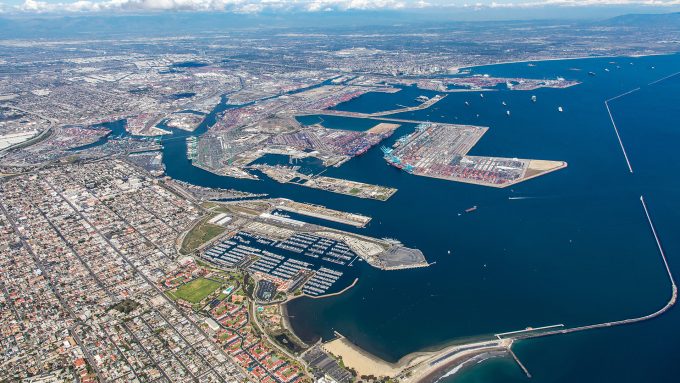Yang Ming to order 13 newbuild box ships for fleet renewal and new markets
Yang Ming today announced plans to acquire 13 containerships ranging in capacity from 8,000 to ...
FDX: ABOUT USPS PRIVATISATIONFDX: CCO VIEWFDX: LOWER GUIDANCE FDX: DISRUPTING AIR FREIGHTFDX: FOCUS ON KEY VERTICALFDX: LTL OUTLOOKGXO: NEW LOW LINE: NEW LOW FDX: INDUSTRIAL WOESFDX: HEALTH CHECKFDX: TRADING UPDATEWMT: GREEN WOESFDX: FREIGHT BREAK-UPFDX: WAITING FOR THE SPINHON: BREAK-UP ALLUREDSV: BREACHING SUPPORTVW: BOLT-ON DEALAMZN: TOP PICK
FDX: ABOUT USPS PRIVATISATIONFDX: CCO VIEWFDX: LOWER GUIDANCE FDX: DISRUPTING AIR FREIGHTFDX: FOCUS ON KEY VERTICALFDX: LTL OUTLOOKGXO: NEW LOW LINE: NEW LOW FDX: INDUSTRIAL WOESFDX: HEALTH CHECKFDX: TRADING UPDATEWMT: GREEN WOESFDX: FREIGHT BREAK-UPFDX: WAITING FOR THE SPINHON: BREAK-UP ALLUREDSV: BREACHING SUPPORTVW: BOLT-ON DEALAMZN: TOP PICK

Matson and Ocean Alliance member containerships arriving at the heavily congested US west coast hub ports of Los Angeles and Long Beach are getting worked well ahead of their competitors, according to an Alphaliner survey.
Analysis by the consultant of the transit times of 62 import vessels, taken from the last Asian port of loading to berthing at LA and LB terminals during the two-week period from 5-19 November, ranged from a total transit of just 10 days to a colossal 73 days.
The best inclusive transit time of 10 days was achieved by the 5,514 teu President Wilson on the CMA CGM Eagle Express EX1 service between Busan and Los Angeles.
This compared with the 73-day transit of the 1,732 teu A Kinka, operated by niche carrier Transfer Shipping, and although having sailed from its last loading port, Hong Kong, on 27 August, was idled in the San Pedro Bay area for two months before eventually securing a berth and labour.
And, according to Alphaliner’s calculation, the unexpectedly long transit for the ad-hoc transpacific sailing would have cost the operator some $5.8m in charter hire –considerably denting the voyage result of the handy container vessel.
The analysis revealed that US-owned Pacific carrier Matson, which benefited from having its in-house SSA, Marine Matson Terminal facility at Long Beach, achieved the best total transit time average of 15 days for the six vessel arrivals surveyed during the period.
Evergreen was the second-fastest carrier, with an average transit time of 17 days for five import loaders, three of which were handled at its own Everport terminal, while two other arrivals appear to have received priority at the APMT/Maersk Pier 400 facility.
Ocean Alliance partner CMA CGM’s 11 ships surveyed saw an average transit time of 22 days, which compared favourably with the overall average transit of 28 days.
“The interest of CMA CGM in regaining full control of the Fenix Terminal at a surplus price of $1.25bn can be explained by the fact that its ships are berthed six days faster than the average,” said Alphaliner.
Cosco, the third member of the OA, and its subsidiary OOCL this week launched its new China South Express service, achieved a transit time for its seven sailings surveyed three days below the average at 25 days.
Meanwhile, 2M partners Maersk and MSC saw average transit times above 30 days for their joint or standalone services, while THE Alliance members Hapag-Lloyd, ONE, Yang Ming and HMM achieved transit times for their VSA and standalone loops, averaging 30-40 days, during the survey period.
Elsewhere, Zim’s attempts to operate its three weekly Asia-US e-commerce express services on the route have been thwarted by the lack of charter tonnage and the average 40-day transit times of its services, according to Alphaliner, which noted that between 5 and 19 November only one of the Israeli carrier’s ships had arrived at Los Angeles.
However, it is the newcomers to the trade and the ad-hoc charter operators, some of which reportedly sailed from Asia before having any terminal agreement in place, that are suffering the longest idling time.
“Chinese intra-Asian carriers and other newcomers that recently entered the transpacific trade clearly have challenges getting their ships into LA/LB,” said Alphaliner.
It noted that CU Lines had achieved a “reasonable” average of a 34-day transit, while another carrier new to the transpacific trade, BAL Container Line, still had three ships at anchor on 19 November for a combined 121 days.
Comment on this article